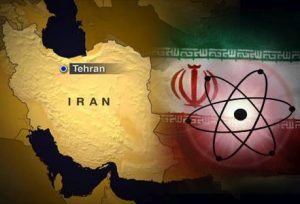By: Cody Knapp
Earlier this semester, I listened as two of my professors bemoaned the world’s obsession with Hitler. The public, as they perceive it, cannot seem to see past Hitler in any discussion of 20th century history. While observing the current direction of American politics, I find myself similarly critical of the current crop of presidential candidates. Rather than an obsession with Hitler, these candidates (save for Ron Paul) cannot seem to entertain anything more than a disturbingly hawkish American policy with regards to Iran. Even respected publications have contributed to the belligerent rhetoric surrounding this topic, including Foreign Affairs, which published on its front cover a story by Dr. Matthew Kroenig that declared it is now “Time to Attack Iran.” Proposals such as this could not be more reckless.
The enmity and uncertainty that clouds U.S.–Iranian relations is certainly one of the most salient issues currently facing American foreign policy, but the public discussion of possible solutions has remained incredibly irresponsible. Based on political rhetoric, it appears that the only options arrayed before the U.S. range from endorsing and participating in an Israeli-led bombing campaign to engaging in covert actions of an illegal nature (assassinations and sabotage). Several politicians have repeated the vague, disconcerting statement that the U.S. should take “whatever steps necessary” to prevent a nuclear-armed Iran. Public statements such as these, while serving to mobilize the American public for a potential confrontation, will simply reinforce the Iranian government’s resolve to build a nuclear weapon.
In the post-Cold War era, the United States has lacked a consistent enemy on the international stage. This loss of bipolarity has rendered an already complicated international community almost too complex for the common American voter to comprehend. Perhaps in a bid to provide moral clarity to the American public in the post-9/11 world, former President George W. Bush and his speechwriter David Frum created the “Axis of Evil,” first articulating this idea in Bush’s 2002 State of the Union. While being a catchy phrase and simplifying international relations for the casual observer, this statement cast Iran, Iraq and North Korea as the Nazi Germany, Fascist Italy, and Imperial Japan of the twenty-first century. It irrevocably showed that the United States viewed each of these states as an enemy, not as states with whom America could potentially strengthen ties and cooperate in areas of common interest. Subsequently, Iran began to take steps to secure itself in an increasing hostile environment. It isn’t simple coincidence that Iran’s efforts to acquire a nuclear weapon and its government’s intransigence in the international arena have intensified in the years since 2002.
The bellicose language emanating from the likes of Newt Gingrich and Dr. Kroenig is only reinforcing the fractured, deeply unpopular Iranian regime’s commitment to the pursuit of nuclear weapons. Their statements ignore the realities of a conventional military engagement with Iran, as they pretend that a “surgical military strike” on Iran’s nuclear facilities is possible. They point to the infamous illegal Israeli bombings of Iraq in 1981 that crippled Iraqi nuclear ambitions as an example for emulation, but fail to note that Iranian anti-aircraft installations are infinitely more sophisticated than were their Iraqi counterparts (It is interesting to note here that many neoconservative icons, including Jeane Kirkpatrik and Margaret Thatcher, condemned the Israeli strikes at the time of their occurrence). It has been estimated that a two-month air campaign would be necessary before attacks on nuclear installations could commence safely. The effort to present the public with an image of war with Iran as being quick and clean, as was done with the war in Iraq, is irresponsible and should be recognized as undermining U.S. interests and the American reputation both in the region and internationally.
This imprudent debate is also undermining a stated goal of American foreign policy: promoting democracy. In the wake of the Arab Spring, democratization is on the minds of many Middle Eastern analysts, and it is my firm belief that no state in the Middle East enjoys more propitious prospects for democratization than Iran. While Libyans will struggle for the foreseeable future to create the civil society and institutions necessary for a functioning democracy, these prerequisites are already present and thriving in Iran. Iran boasts a relatively high level of human development, meaning that its populace is well educated, literate and enjoys a high standard of living. It also possesses institutions like a judicial system and a parliament that, while currently flawed, can provide the blueprint for a successful democracy in the future.
It is easy for Americans to forget that the current regime in Iran came to power in the vacuum left by a popular revolution against a U.S.–installed dictator. This dictator, Mohammed Reza Pahlavi, had consolidated his power after the U.S. and Britain removed the popularly elected Prime Minister, Dr. Mohammed Mossadeq, through a coup. Iranian civil society rose up and overthrew this undemocratic government, just as it will eventually rise up against the current regime if given time. U.S. politicians underestimate the level of division in Iranian society and even within the state government of Iran. Unnecessary aggression will only unite these opposing parties, not intimidate a proud nation such as Iran into submission.
The discourse surrounding Iran needs to shift. Politicians should be discussing and debating diplomatic options, and responsibly explaining to the public the real consequences of a nuclear Iran (which almost certainly do not involve the immediate destruction of Israel). Those who wish to make policy decisions should demonstrate sobriety, clarity and depth of thought in their ideas. With respect to Iran, this means considering policies that make life as a nuclear state unpalatable to the Iranian elite (i.e, stronger, more targeted sanctions), while also ensuring that the Iranians understand that the international community will not be an enemy in the future if they abandon their nuclear program. The proverbial “stick” is an important part of diplomacy, but it’s the job of American policy makers to act responsibly and provide enough “carrot” to justify the desired shift.

